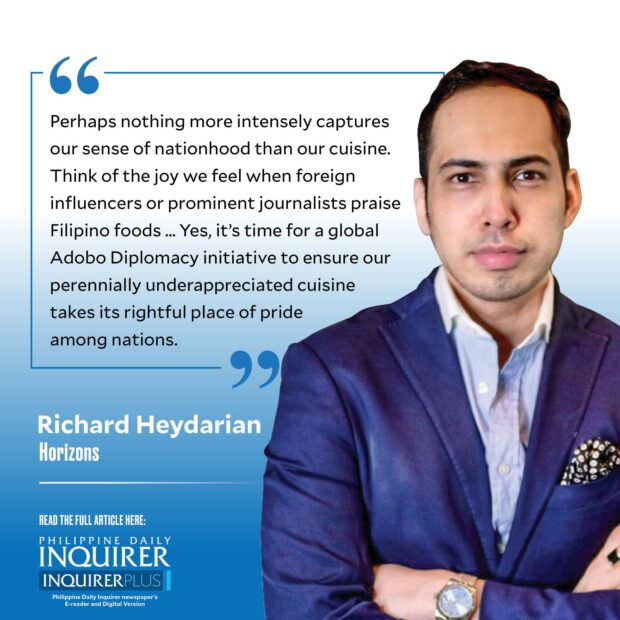Adobo Diplomacy: Making Filipino food global
 Food is everything we are,” argued Anthony Bourdain, arguably the most influential food critic of the past half a century. “It’s an extension of nationalist feeling, ethnic feeling, your personal history, your province, your region, your tribe, your grandma.”
Food is everything we are,” argued Anthony Bourdain, arguably the most influential food critic of the past half a century. “It’s an extension of nationalist feeling, ethnic feeling, your personal history, your province, your region, your tribe, your grandma.”
The great political scientist Benedict Anderson famously argued that a crucial element of nationhood—essentially, an “imagined community”—is the constellation of shared experiences. Perhaps nothing more intensely captures our sense of nationhood than our cuisine. Think of the joy we feel when foreign influencers or prominent journalists praise Filipino foods, including Jollibee meals.
Dear reader: it goes without saying that Filipino cuisine is arguably the most underrated post-colonial meal. Once I saw an American academic confidently placing the Philippines at the bottom of the list of Southeast Asian nations in terms of national cuisine. A few years earlier, a usually humorous British friend of mine unironically told me: “You guys are the English of Asia [when it comes to food], right?”
On one hand, the Philippines is a victim of its own “success”: Filipino “food” got early exposure in the West, except on wrong shows such as Joe Rogan’s “Fear Factor.” But I would argue that we are also a victim of poor public diplomacy, underscoring the need for systematically highlighting the breathtaking diversity and profoundly underappreciated sumptuousness of Filipino cuisine.
From the vegetable-heavy foods I enjoyed in my grandmother’s home in Baguio to the exquisitely colorful and sumptuously nourishing meals I tasted during my trip to Marawi, I can confidently argue that Filipino cuisine is as rich as it is diverse. What we need, however, is a proactive effort to not only promote our great cuisine but also shatter all that “Fear Factor” stereotypes. And our beloved government, which has had little qualms with spending millions on inaesthetic logos and questionable tourism campaigns, should step up to the game.
The global success of Thai cuisine is the upshot of a decade-long public diplomacy campaign. Beginning in the early 2000s, Bangkok launched the Global Thai initiative, which ensured overseas Thai restaurants could seamlessly source chefs, ingredients, and even soft loans. The Thai government came up with a “Thai Select” certification mechanism to standardize and upgrade the quality of food and overall services offered by Thai restaurants in global cities.
The Thai government even pursued bilateral agreements to facilitate the entry of high-caliber Thai chefs to overseas destinations. The astonishingly successful campaign catapulted Thai cuisine to the top of the global food chain. It didn’t take long before other countries followed through, including South Korea, Taiwan, Malaysia, and Peru. Meanwhile, numerous countries from Algeria to Belarus, Ukraine, and Singapore successfully managed to land their food-related traditions in the Unesco List of Intangible Cultural Heritage.
It’s not only a question of validation and prestige, but also tourism revenues. No wonder, “gastro-diplomacy” has also involved local government units assiduously sponsoring much-coveted certification by the likes of Michelin Guide. Around the world, there are 16,600 restaurants in the Michelin Guide list, with 3,400 enjoying a star rating, and 142 relishing three stars.
Despite its seemingly elitist image, the Michelin Guide is far more democratic than the World’s 50 Best Restaurants list or restaurants with James Beard Awards. Shockingly, however, the Philippines is largely absent in the Michelin universe. And that’s just the tip of the iceberg. Clearly, it’s time for innovation and drastic action.
The late Filipino food critic, Clinton Palanca, rightly argued, “There is no such thing as a completely Filipino banquet, partly because of the great paradox that to be Filipino is to love the foreign.” Think of ‘Jollibee Spaghetti,’ which is far more Filipino than, say, Italian. But we can clearly go beyond exporting fast food.
Despite its Hispanic origins, adobo is as Filipino as it can get. And it’s arguably one of the most promising elements in Filipino cuisine, which can come in many shapes and serve as a core element of a global private-public-partnership initiative. Think of our Department of Foreign Affairs working in tandem with world-class influencers such as Erwan Heussaff to both demolish unjust stereotypes about Filipino food as well as highlight the amazing breadth and depth of our national cuisine. Yes, it’s time for a global Adobo Diplomacy initiative to ensure our perennially underappreciated cuisine takes its rightful place of pride among nations.
rheydarian@inquirer.com.ph




















